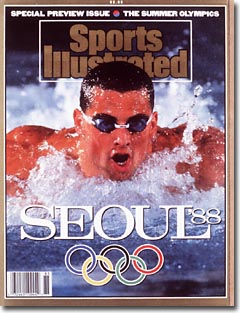 A reporter put me onto an excellent Sports Illustrated article written during the 1988 Summer Games in Seoul. Author Leigh Montville writes about being “On the Trail of the O-Word,” in which he concludes that ”[d]espite official efforts to curb unsanctioned use of the word ‘Olympic,’” it is “here, there and everywhere.”
A reporter put me onto an excellent Sports Illustrated article written during the 1988 Summer Games in Seoul. Author Leigh Montville writes about being “On the Trail of the O-Word,” in which he concludes that ”[d]espite official efforts to curb unsanctioned use of the word ‘Olympic,’” it is “here, there and everywhere.”
To illustrate his point, he riffs on “Olympic” names he comes across in everyday life: Olympic Burger and Burrito. Olympic Fish and Meat Market. Olympic Fruit and Vegetable. Olympic Bar B Que. Olympic Pawn Shop. Olympic Van Lines. His list goes on and on.
“Is there any fair-sized town that does not have an Olympic Diner somewhere on its outskirts?” he asks. “One Olympic Diner leads into two Olympic Realty offices, which lead into three Olympic Laundromats. There seem to be no boundaries. These Olympics are everywhere. Around the country. Around the world. The Olympic Diner of Abu Dhabi? The Olympic Diner of Beijing? The Olympic Diner of Moscow? Everywhere.”
 Mr. Montville cites to an estimate that 40,000 Olympic-named businesses exist out there — almost all of which in my view are th result of an innocent failure to heed the Ted Stevens Olympic and Amateur Sports Act, 36 U.S.C. § 220506, which prohibits most commercial use of the word “Olympic” outside of Washington’s Olympic Peninsula after Sept. 21, 1950.
Mr. Montville cites to an estimate that 40,000 Olympic-named businesses exist out there — almost all of which in my view are th result of an innocent failure to heed the Ted Stevens Olympic and Amateur Sports Act, 36 U.S.C. § 220506, which prohibits most commercial use of the word “Olympic” outside of Washington’s Olympic Peninsula after Sept. 21, 1950.
The article goes on to say: “If the USOC owns the word, the USOC can do anything it wants with that word. ‘We got a letter saying that we couldn’t use the name,’” one business owner said. “‘Our attorney told us it would cost $50,000, minimum, to fight the case. I have been around enough lawyers to know how much ‘$50,000 minimum’ can become. We changed the name.’”
The USOC’s perspective? “‘We don’t go looking through telephone listings, no,’ says Richard Kline, chief legal adviser for the USOC. ‘But if someone brings something up to us, we’ll follow it up.’
“Off the record, USOC officials claim they have no interest in the Olympic taxidermies of the land. They mostly are interested in competitions or fund-raising ventures that try to use the name or the Olympic logo. This does not mean they don’t have the legal option to become interested. A threatening letter can arrive at any time. The comic opera always can be brought to the stage.”
Just so it’s clear, I’m all for the USOC enforcing its mark against competitions and businesses that try to trade on the Olympics’ goodwill. Unfortunately, it doesn’t stop there. If the USOC avoided the comic opera, I’d be its biggest fan.
The article cite is Leigh Montville, “On the Trail of the O-Word,” Sports Illustrated (Olympic Preview, Sept. 1988). I’m sorry to say I couldn’t find a publicly available copy to link to.